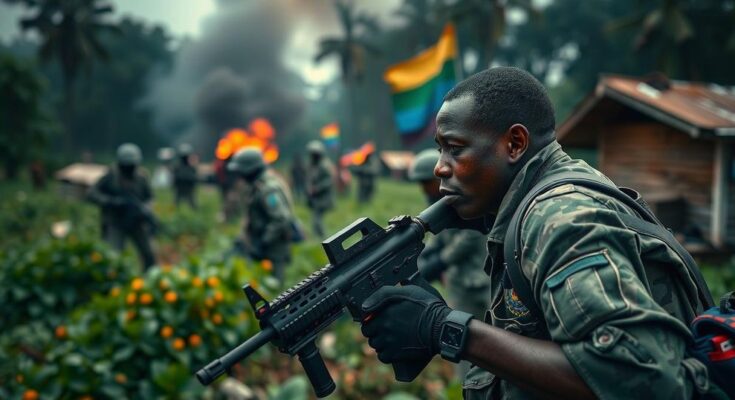Clashes in eastern DRC have intensified between Rwanda-backed rebels and the Congolese military despite a ceasefire. The M23 militia, which has seized territory since 2021, recently launched localized offensives. Diplomatic discussions persist, with regional leaders set to meet in December. The humanitarian situation remains critical as tens of thousands are displaced.
Fighting has surged in the eastern Democratic Republic of Congo (DRC), as clashes continue between Rwanda-supported rebels and the Congolese army, despite the existence of a ceasefire. Local and military sources reported that the M23 militia, which has been actively supported by Rwanda since 2021 and claims to defend ethnic Tutsis, has captured significant territories in eastern DRC, leading to a humanitarian crisis and the displacement of thousands of individuals. Recently, the M23 militia has positioned itself around the provincial capital Goma, exacerbating tensions in the region.
In August, Angola intervened to mediate a fragile truce, which temporarily stabilized the frontline. However, by late October, the M23 initiated localized offensive operations, disregarding the ceasefire, while the DRC’s military and pro-Kinshasa militias endeavored to repel the insurgents. Despite ongoing ceasefire violations, diplomatic discussions between the DRC and Rwanda continue to occur, facilitated by Angola. An M23 spokesman remarked, “We are not concerned in any way” regarding the agreement between the DRC and Rwanda.
Recent hostilities intensified as clashes erupted on Sunday in the Lubero territory, north of the M23’s active zone, particularly along the road to Butembo, a vital commercial center under the control of Kinshasa, situated approximately 60 kilometers from areas of active fighting. Both factions accuse each other of initiating attacks, yet no significant territorial changes have been observed. The Congolese armed forces reported a continuation of violence as the situation remains ambiguous on the ground. Reinforcements have been sent to the northern front, an area that had seen relative stability post-ceasefire, prompting concerns of further escalation. Concurrently, M23 forces have engaged with pro-Kinshasa armed factions in the Masisi region of North Kivu province. Displaced individuals have begun to seek refuge in the town of Kitsambiro as reported by local officials.
Looking ahead, Rwandan President Paul Kagame and Congolese President Felix Tshisekedi are scheduled to meet in Luanda, Angola, on December 15 to engage in discussions aimed at addressing the ongoing conflict.
The eastern Democratic Republic of Congo has experienced prolonged instability and conflict, particularly involving the M23 militia, which emerged in 2021 amid allegations of Rwandan support. The region has faced chronic humanitarian crises, with significant civilian displacement and the struggle for control over valuable resources. The fragile ceasefire, brokered by Angola, was intended to provide a respite in hostilities but has been undermined by ongoing military actions from both the M23 and Congolese forces. The unfolding situation presents grave concerns not only for regional stability but also for the safety and well-being of affected populations.
In summary, escalating clashes in eastern DRC highlight the fragile nature of the ceasefire between the M23 rebels and the Congolese army, underscoring the complexity of the conflict. With both sides reinforcing their positions and ongoing diplomatic efforts between Rwanda and the DRC, the situation demands continued international attention. The December 15 meeting between the two leaders may represent a critical juncture in addressing the deep-rooted issues fueling violence in the region.
Original Source: www.barrons.com




